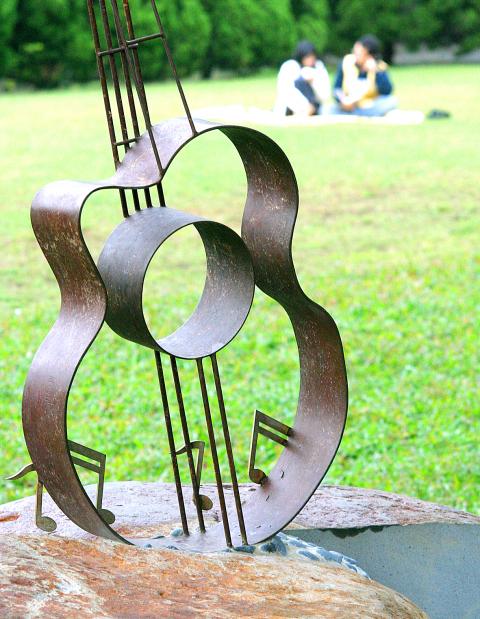Taiwan in Time: Sept. 7 to Sept. 13
Less than a year after he ignited Taiwan’s campus nativist folk song movement by proclaiming “sing our own songs” (唱自己的歌) on stage during a Western folk music event, Lee Shuang-tze (李雙澤) drowned on Sept. 10, 1977 at the age of 28 attempting to save a fellow swimmer.
After Lee’s death, his friends and fellow folk singers Yang Tzu-chun (楊祖珺) and Ara Kimbo, commonly known as Kimbo Hu (胡德夫), premiered an unreleased song, Formosa (美麗島), at his funeral.

Photo courtesy of Tamkang Time
Lee wrote the melody, but the lyrics were adapted by Liang Ching-fong (梁景峰) from an earlier poem, depicting the beauty of Taiwan. However, the song became forever politicized and was even banned by the KMT due to its name being used for Formosa Magazine (美麗島雜誌), a magazine created by the opposition to Chinese Nationalist Party’s (KMT) one-party rule.
The 1979 raid on the magazine’s headquarters and arrest of opposition politicians would become known as the Kaohsiung Incident, also known as the Formosa Incident (美麗島事件), but that is another story.
In the 1970s, Western folk music was popular in Taipei coffeehouses, but there was also a nationalist and nativist sentiment brewing as Taiwan was gradually losing its international political status to China while opposition grew against the KMT regime. Part of this sentiment included many young Taiwanese involving themselves in the “Safeguard the Diaoyutais Movement” (保釣運動). Back then, even though Lee would often sing in Hoklo (commonly know as Taiwanese), he still used “Chinese” (中國人) to describe the people of Taiwan because of the political climate.
Author Ma Shi-fang (馬世芳) retells the incident in his book Subterranean Homesick Blues (地下鄉愁藍調). Lee reportedly took the stage with a guitar and bottle of Coca-Cola during a folk music festival in 1976 at Tamkang University (淡江大學), where mostly Western songs were performed. He wasn’t even originally invited — he came as Ara Kimbo’s replacement, who was unable to sing due to a broken tooth.
There were no recordings or photos of what happened next, and the performance gained legendary status in campus circles, and became immortalized as the “Tamkang Incident” (淡江事件).
When Lee took the stage, he allegedly criticized the previous performer for playing English songs. He had just returned to Taiwan after spending time in the US, Spain and Philippines. Why can’t we sing in our own language, he wondered.
“Before we are able to write our own songs, we should sing the songs of our predecessors,” Lee said, and proceeded to smash the Coca-Cola bottle, a symbol of Western globalization, on the floor.
He then sang the then-banned Hoklo song Mending the Net (補破網) and other classics of that time. The crowd mostly booed him. He switched to English, sang Bob Dylan’s Blowing in the Wind, and reportedly proclaimed, “We should sing our own songs!” before storming off the stage.
The performance was not exactly successful. Many people, Ma included, say that the story is likely to have been embellished as it spread. And whether Lee smashed the bottle remains a point of contention.
But the impact of the incident was significant, as it sparked discussion in campus publications about the lack of and potential for Hoklo-language folk songs. It also inspired college students around the nation to pick up a guitar and start writing their own songs.
Taiwan in Time, a column about Taiwan’s history that is published every Sunday, spotlights important or interesting events around the nation that have anniversaries this week.

Dissident artist Ai Weiwei’s (艾未未) famous return to the People’s Republic of China (PRC) has been overshadowed by the astonishing news of the latest arrests of senior military figures for “corruption,” but it is an interesting piece of news in its own right, though more for what Ai does not understand than for what he does. Ai simply lacks the reflective understanding that the loneliness and isolation he imagines are “European” are simply the joys of life as an expat. That goes both ways: “I love Taiwan!” say many still wet-behind-the-ears expats here, not realizing what they love is being an

William Liu (劉家君) moved to Kaohsiung from Nantou to live with his boyfriend Reg Hong (洪嘉佑). “In Nantou, people do not support gay rights at all and never even talk about it. Living here made me optimistic and made me realize how much I can express myself,” Liu tells the Taipei Times. Hong and his friend Cony Hsieh (謝昀希) are both active in several LGBT groups and organizations in Kaohsiung. They were among the people behind the city’s 16th Pride event in November last year, which gathered over 35,000 people. Along with others, they clearly see Kaohsiung as the nexus of LGBT rights.

In the American west, “it is said, water flows upwards towards money,” wrote Marc Reisner in one of the most compelling books on public policy ever written, Cadillac Desert. As Americans failed to overcome the West’s water scarcity with hard work and private capital, the Federal government came to the rescue. As Reisner describes: “the American West quietly became the first and most durable example of the modern welfare state.” In Taiwan, the money toward which water flows upwards is the high tech industry, particularly the chip powerhouse Taiwan Semiconductor Manufacturing Co (TSMC, 台積電). Typically articles on TSMC’s water demand

Every now and then, even hardcore hikers like to sleep in, leave the heavy gear at home and just enjoy a relaxed half-day stroll in the mountains: no cold, no steep uphills, no pressure to walk a certain distance in a day. In the winter, the mild climate and lower elevations of the forests in Taiwan’s far south offer a number of easy escapes like this. A prime example is the river above Mudan Reservoir (牡丹水庫): with shallow water, gentle current, abundant wildlife and a complete lack of tourists, this walk is accessible to nearly everyone but still feels quite remote.